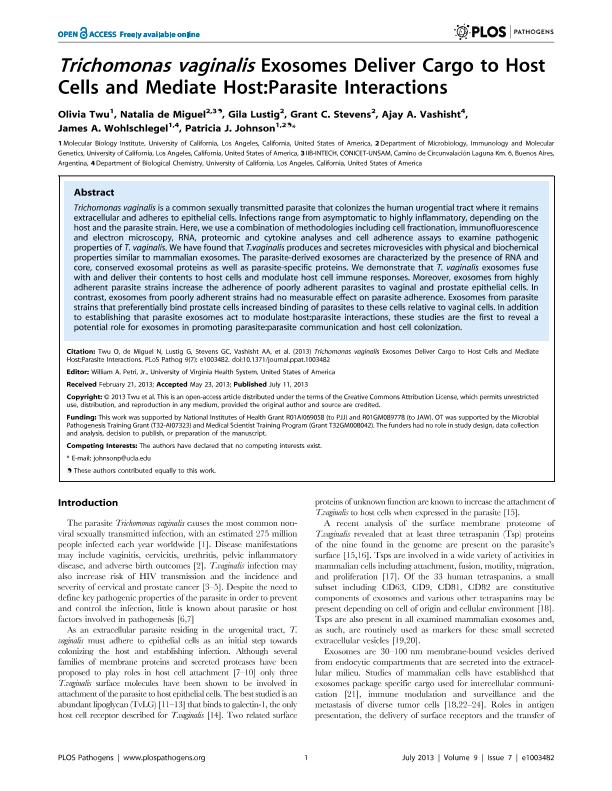Artículo
Trichomonas vaginalis Exosomes Deliver Cargo to Host Cells and Mediate Host: Parasite Interactions
Twu, Olivia; de Miguel, Natalia ; Lustig, Gil; Stevens, Grant C.; Vashisht, Ajay A.; Wohlschlegel, James A.; Johnson, Patricia J.
; Lustig, Gil; Stevens, Grant C.; Vashisht, Ajay A.; Wohlschlegel, James A.; Johnson, Patricia J.
 ; Lustig, Gil; Stevens, Grant C.; Vashisht, Ajay A.; Wohlschlegel, James A.; Johnson, Patricia J.
; Lustig, Gil; Stevens, Grant C.; Vashisht, Ajay A.; Wohlschlegel, James A.; Johnson, Patricia J.
Fecha de publicación:
11/07/2013
Editorial:
Public Library of Science
Revista:
Plos Pathogens
ISSN:
1553-7366
Idioma:
Inglés
Tipo de recurso:
Artículo publicado
Clasificación temática:
Resumen
Trichomonas vaginalis is a common sexually transmitted parasite that colonizes the human urogential tract where it remains extracellular and adheres to epithelial cells. Infections range from asymptomatic to highly inflammatory, depending on the host and the parasite strain. Here, we use a combination of methodologies including cell fractionation, immunofluorescence and electron microscopy, RNA, proteomic and cytokine analyses and cell adherence assays to examine pathogenic properties of T. vaginalis. We have found that T.vaginalis produces and secretes microvesicles with physical and biochemical properties similar to mammalian exosomes. The parasite-derived exosomes are characterized by the presence of RNA and core, conserved exosomal proteins as well as parasite-specific proteins. We demonstrate that T. vaginalis exosomes fuse with and deliver their contents to host cells and modulate host cell immune responses. Moreover, exosomes from highly adherent parasite strains increase the adherence of poorly adherent parasites to vaginal and prostate epithelial cells. In contrast, exosomes from poorly adherent strains had no measurable effect on parasite adherence. Exosomes from parasite strains that preferentially bind prostate cells increased binding of parasites to these cells relative to vaginal cells. In addition to establishing that parasite exosomes act to modulate host∶parasite interactions, these studies are the first to reveal a potential role for exosomes in promoting parasite∶parasite communication and host cell colonization.
Palabras clave:
Exosomes
,
Parasite
,
Pathogenesis
,
Trichomonas
Archivos asociados
Licencia
Identificadores
Colecciones
Articulos(CCT - LA PLATA)
Articulos de CTRO.CIENTIFICO TECNOL.CONICET - LA PLATA
Articulos de CTRO.CIENTIFICO TECNOL.CONICET - LA PLATA
Citación
Twu, Olivia; de Miguel, Natalia; Lustig, Gil; Stevens, Grant C.; Vashisht, Ajay A.; et al.; Trichomonas vaginalis Exosomes Deliver Cargo to Host Cells and Mediate Host: Parasite Interactions; Public Library of Science; Plos Pathogens; 9; 7; 11-7-2013; 1-14
Compartir
Altmétricas



